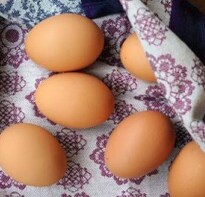Brimming with protein and vitamins and ready in minutes - fill your basket!
With eggs to hand, you always have the makings of a simple, satisfying, near-instant meal. But lavish a little bit of effort on them and you can showcase their deluxe potential, in a towering souffle, an opulent egg custard or a voluptuous Hollandaise sauce.Eggs aren't a uniform staple: they vary enormously in quality. Good eggs have sunny yellow yolks that stand up to attention in jelly-like whites. If they hit the bowl with a sloppy splat, then they're old. Very pale yolks may indicate the hen has never seen a blade of grass.
2 tbsp olive oil
3 banana shallots, peeled and finely sliced
350g new potatoes, washed and sliced into 2cm-wide rounds
3 garlic cloves, all crushed except for one half-clove
1 tin of flageolet beans, drained and rinsed
400g frozen petit pois, defrosted
Couple of strands of saffron
1½ litres chicken or vegetable stock
4 eggs
4 thick slices of bread
Small handful of mixed herbs, such as mint, parsley and chives (optional) 1 Heat the olive oil in a large heavy-based pan, add the shallots and cook gently for about 7 minutes, stirring regularly. While this is happening, toast your bread, then rub with the uncrushed garlic.2 Add the potatoes and crushed garlic to the shallots and cook for a couple of minutes, until the scent of the garlic starts to rise from the pan.3 Add the stock, saffron and a good pinch of salt. When it comes to the boil, add the flageolet beans, simmer for 7 minutes, then add the peas. Simmer for another 5 minutes and taste for seasoning.4 Break the eggs one by one into a cup and carefully slide each into a separate corner of the broth. Simmer for about 4 minutes, until the whites are set and the yolks runny.5 Lift the eggs out carefully and place each on a piece of toast in a warm soup bowl. Stir the herbs into the soup, then ladle into the bowls.• Rosie Sykes is head chef of Fitzbillies and co-author of The Kitchen Revolution (Ebury Press, £25). To order a copy for £19.99 with free UK p&p, go to guardianbookshop.co.uk
Photograph: Jill Mead
With eggs to hand, you always have the makings of a simple, satisfying, near-instant meal. But lavish a little bit of effort on them and you can showcase their deluxe potential, in a towering souffle, an opulent egg custard or a voluptuous Hollandaise sauce.Eggs aren't a uniform staple: they vary enormously in quality. Good eggs have sunny yellow yolks that stand up to attention in jelly-like whites. If they hit the bowl with a sloppy splat, then they're old. Very pale yolks may indicate the hen has never seen a blade of grass.
Why are eggs good for me?
If you want to improve your nutritional status quickly, eating eggs is a most effective way to do it. Eggs are filling because their high-quality protein satisfies the appetite, providing all the essential amino acids. They provide us with every vitamin we need, apart from vitamin C, along with a healthy complement of minerals.Forget the old warning that we shouldn't eat more than three or four eggs a week because they contain cholesterol - that particular gem of "healthy eating" advice has since been ditched. It's now accepted that the cholesterol we eat has little or no effect on blood cholesterol levels, and that we actually need cholesterol to build cell membranes, digest fats and make hormones.Advertisement
Where to buy and what to pay?
Eggs aren't expensive, so it's worth trading up. Go for free-range as a minimum; better still, opt for organic. In farmers' markets, six medium locally sourced organic eggs usually cost around £2, often less than the supermarket equivalent.• Joanna Blythman is the author of What To Eat (Fourth Estate, £9.99). To order a copy for £7.99 with free UK p&p, go to guardianbookshop.co.ukBouillabaisse of peas and beans with a poached egg
This is an inland southern French version of the classic fish soup - a simple and delicious broth enhanced by poached eggs.Serves 4Advertisement
3 banana shallots, peeled and finely sliced
350g new potatoes, washed and sliced into 2cm-wide rounds
3 garlic cloves, all crushed except for one half-clove
1 tin of flageolet beans, drained and rinsed
400g frozen petit pois, defrosted
Couple of strands of saffron
1½ litres chicken or vegetable stock
4 eggs
4 thick slices of bread
Small handful of mixed herbs, such as mint, parsley and chives (optional) 1 Heat the olive oil in a large heavy-based pan, add the shallots and cook gently for about 7 minutes, stirring regularly. While this is happening, toast your bread, then rub with the uncrushed garlic.2 Add the potatoes and crushed garlic to the shallots and cook for a couple of minutes, until the scent of the garlic starts to rise from the pan.3 Add the stock, saffron and a good pinch of salt. When it comes to the boil, add the flageolet beans, simmer for 7 minutes, then add the peas. Simmer for another 5 minutes and taste for seasoning.
Advertisement
Photograph: Jill Mead
Advertisement
For the latest food news, health tips and recipes, like us on Facebook or follow us on Twitter and YouTube.
Advertisement
Tags:
